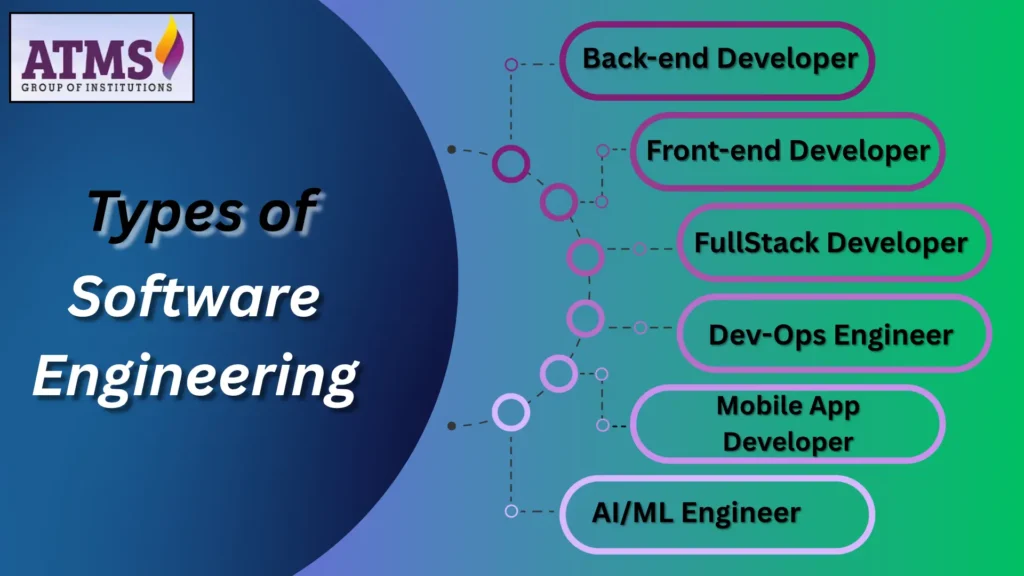Hi! Seekers, we are in the development technology and as everything moving from space to cloud, the reliance on software and SaaS has been increasing on a daily basis, and so the requirement for Software Developer/Engineers increasing exponentially.
So you must be wondering that What is Software Engineering? Learn about its definition, career paths, essential skills, tools, and future trends in this article and choose your carrier efficiently.
Table of Contents

What is Software Engineering?
Software engineering is the systematic application of engineering principles in software development. This lets you fix, add to, and trust the software. It involves planning, coding, testing, and keeping up with the software that powers everything from mobile apps to cloud-based business solutions.
Software engineers make hardware that helps schools, businesses, hospitals, and entertainment venues do their jobs better. They are in charge of making sure that digital tools are safe and work well.

Difference Between Software Engineering and Computer Science
Many people confuse software engineering with computer science, but they have distinct differences:
| Software Engineering | Computer science |
| Focuses on Building, designing and maintaining software systems. | Computer science is the study of how computers perform theoretical and mathematical tasks. |
| It involves the study and application of software only. | It involves the study and application of software and hardware both. |
| It involves some areas of study which are software development, software testing and quality assurance. | It involves areas of study which are networking, artificial intelligence, database systems etc. |
| Software engineering majorly defines architectural and structural properties. | Computer science involves the study of both principals and the use of computer. |

Why Software Engineering is Important?
The world is a lot different now that we have software engineering. It helps people, businesses, and fields use technology well, from simple apps to complicated business systems. With each new piece of technology that comes out, there is a greater need for skilled software engineers. Because of this, it’s one of the best and safest jobs you can get right now.
A lot of things make software engineering important right now:
1. Powers Digital Transformation
Digital transformation is the process of integrating digital technologies into all areas of business and society, fundamentally changing how industries operate and deliver value. Software engineering is the backbone of this transformation, enabling businesses to move from traditional methods to modern, technology-driven solutions.
- E-commerce: Platforms like Amazon, Shopify, and Flipkart use advanced software to provide seamless online shopping experiences, inventory management, and personalized recommendations.
- Artificial Intelligence (AI): AI-driven applications such as chatbots, virtual assistants, and predictive analytics rely on software engineering for data processing and decision-making.
- Healthcare Technology: From telemedicine to electronic health records (EHRs), software engineers develop tools that improve patient care and streamline medical workflows.
- Finance & Banking: Online banking, fintech applications, and blockchain technologies are built and maintained through robust software engineering practices.
As industries continue to integrate new technologies, software engineering remains at the core of automation, efficiency, and innovation.
2. High Demand & Job Growth
Coding software is one of the jobs that is growing the fastest in the world. According to the U.S. Bureau of Labor Statistics, the number of software engineering jobs will grow 22% by 2030. This is a lot faster than the average for all jobs.
- Growing Demand Around the World: As more businesses move online, they need skilled software engineers in areas like healthcare, entertainment, defense, and finance.
- Good Pay and Flexible Hours: Software engineers make a lot of money, can work from home, and have a lot of freedom with their schedules. In the U.S., a software engineer makes more than $120,000 a year. In India, a skilled engineer can make more than ₹25L a year.
- New Technologies Offer New Job Opportunities: Jobs are opening up in areas like AI, blockchain, cybersecurity, and cloud computing. This means that software engineering will always be a field that needs people.
Because there is always a need for skilled developers, people who get into the field will always have work and their work will grow over time.
3. Enables Innovation
Technology is moving forward faster than ever before, and software engineering is at the heart of all of these changes. Without it, AI, cloud computing, cybersecurity, and robotics wouldn’t be what they are today.
- Advanced software engineering is what makes AI-powered systems possible, like self-driving cars and smart recommendation engines (Netflix, YouTube).
- Cloud computing and SaaS (Software as a Service): Google Drive, AWS, and Microsoft Azure are just a few of the cloud-based storage, computing, and security services that people and companies use every day.
- Cybersecurity: As cyber threats grow, software engineers are making security frameworks, encryption methods, and threat detection systems that are more advanced to protect private data.
- Blockchain and Web3: New software engineering is what keeps decentralized technologies like blockchain, smart contracts, and cryptocurrencies (like Bitcoin and Ethereum) safe and open.
Software engineering pushes the boundaries of what technology can do, which helps things move forward. This changes the way people live, work, and talk to each other.

Types of Software Engineers:
There are many roles in software engineering, and each one needs its own set of skills and tools. These specializations cover many parts of software development, such as designing user interfaces, managing databases, deploying applications, and even working with AI.
Here are some of the most important types of software engineering jobs:
1. Frontend Developer
Focus: Making sure that users have a good time using the things you make.
Frontend writers are responsible for everything that users can see and do on an app or website. They think about style, responsiveness, performance, and how easy it is for people to use. Their job is very important for making sure that websites and apps are easy to use and look good.
- You need to know HTML, CSS, JavaScript, React, Angular, and Vue.js.
- Chrome DevTools, Visual Studio Code, and Figma are all common tools.
2. Backend Developer
Focus: looking after the code that runs on the server, APIs, and databases.
Backend developers create and take care of the server side of apps. They make APIs, work with databases, and handle authentication. Their job is to make sure that data is stored safely and can be quickly accessed when needed.
- You should know how to use SQL, NoSQL, Python, Java, and Node.js.
- PostgreSQL, MySQL, MongoDB, and Docker are all tools that many people use.
3. Full-Stack Developer
Focus: Working on both the front end and the back end.
Full-stack developers are responsible for everything that goes into making software, from designing user interfaces to managing databases and server logic. They know how to use both frontend and backend technologies, which is helpful for small teams and businesses that need developers who can do a lot of different things.
- You need to know how to use the MERN Stack (MongoDB, Express, React, and Node.js) and the MEAN Stack (MongoDB, Express, Angular, and Node.js).
- Git, Webpack, and GraphQL are all tools that many people use.
4. DevOps Engineer
Focus: Continuous Integration/Continuous Deployment (CI/CD), cloud infrastructure.
DevOps engineers bridge the gap between software development and IT operations. They ensure that applications are deployed efficiently, remain scalable, and are continuously monitored for performance improvements. Their expertise helps organizations automate processes, enhance security, and improve deployment speeds.
- You need to know how to use AWS, Docker, Kubernetes, Jenkins, Terraform.
- Common Tools are GitHub Actions, Kubernetes, Ansible.
5. Mobile App Developer
Focus: Creating applications for Android and iOS devices.
Mobile app developers are experts at making software programs that work on smartphones, tablets, and other mobile devices. Their job is to make sure that apps work better, work on more devices, and have features that work well on mobile devices.
- You need to know Swift (for iOS), Kotlin (for Android), React Native, and Flutter.
- Xcode, Android Studio, and Firebase are all common tools.
6. AI/ML Engineer
Focus: Making models for AI and machine learning.
AI/ML engineers build smart systems that can look at data, find patterns, and make choices with little help from people. Their work is very important in areas like finance, healthcare, self-driving cars, and cybersecurity.
- You need to know how to use Python, TensorFlow, PyTorch, and OpenCV.
- Jupyter Notebook, Google Colab, and AWS SageMaker are all tools that are often used.

How to Become a Software Engineer?
Becoming a software engineer is fun and rewarding, but you need to know a lot about technology, be able to solve problems, and have some experience working with computers.
There are many ways to get into the field, whether you’re a student, want to switch careers, or learn on your own. The most important thing is to learn the right things, do projects that are useful in the real world, and look for a job.
1: Choose the Right Education Path
- Bachelor’s Degree in CS or IT – The traditional and most recognized route.
- Coding Bootcamps – Short, intensive programs like Lambda School or App Academy.
- Self-Learning – Online resources like Coursera, Udemy, and freeCodeCamp.
2: Learn Programming Languages
- Python – Best for AI, machine learning, and automation.
- JavaScript – Essential for web development.
- Java – Used for enterprise applications.
- C++ – Ideal for system programming and game development.
3: Master Data Structures & Algorithms
- Improves problem-solving and performance optimization.
- Recommended platforms: LeetCode, HackerRank, CodeChef, Codewars.
4: Build Real-World Projects
- Develop portfolio projects (e.g., personal websites, CRUD applications).
- Contribute to open-source projects on GitHub.
5: Apply for Internships & Jobs
- Build a strong LinkedIn profile and resume.
- Use job boards like LinkedIn, Glassdoor, Indeed, and Stack Overflow Jobs.

Software Engineering Careers & Jobs
Why do you want to be a software engineer? A lot of companies are looking for software engineers, so jobs are safe. There are also more jobs in fields like AI, cybersecurity, and cloud computing. It pays well and lets you work from home or anywhere else in the world.
People in this field have to keep learning and coming up with new ideas, which keeps it interesting and always changing. There are more than 27 million software engineers working around the world, and that number is still going up.
Pay that is very good—software workers get some of the best pay in tech. Having freedom at work means you can work from home, do freelance work, or start your own business.
Career Growth Roadmap
- Junior Developer (0-2 years) – ₹5L-₹12L/year (India), $60K-$90K/year (USA).
- Mid-Level Developer (2-5 years) – ₹12L-₹25L/year, $90K-$130K/year.
- Senior Developer (5-10 years) – ₹25L-₹50L/year, $130K-$200K/year.
- Lead Engineer / CTO (10+ years) – ₹50L+ and stock options.
Best Industries for Software Engineers
- FinTech (Banking & Payments).
- AI & Machine Learning.
- Cybersecurity.
- Cloud Computing.
- Game Development.

Future of Software Engineering
AI, robotics, and quantum computing are changing software engineering and the way it is done very quickly. In the future, blockchain, cloud computing, and cybersecurity will be very important.
There will be a lot of exciting job opportunities because the need for skilled developers will keep growing. Software engineers will be the ones who help all kinds of businesses go digital as technology gets better.
- AI and Automation in Software Development: AI-powered tools like GitHub Copilot and ChatGPT are changing how we write code, test it, and fix bugs. This speeds up development and makes it better.
- The rise of no-code and low-code platforms: Platforms like Bubble and Webflow let people who aren’t developers make software, which makes it easier for more people to build apps.
- Big tech companies like Google and IBM are making quantum computing better. This will lead to huge advances in software engineering.
- Augmented and virtual reality (AR and VR) are improving fields like gaming, education, and business apps by making digital experiences more real.
Conclusion
There are a lot of jobs in software engineering, and it’s a fun field that pays well and is growing quickly. Even though technology is always changing, there is still a high demand for skilled software engineers in areas like AI, hacking, cloud computing, and automation.
Whether you’re just starting out or want to focus, it’s important to learn new programming languages, work on real-world projects, and keep learning. If you have the right skills, experience, and drive, you can get a good job, make history, and shape the future of technology.



Looking forward to your next post!
Clear, concise, and effective.
We are at your service as always